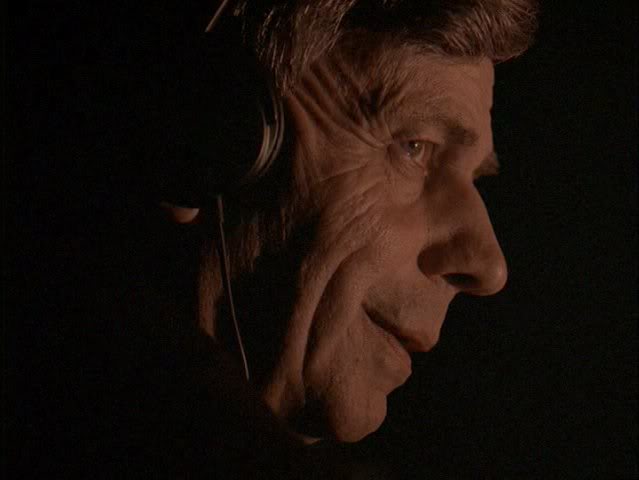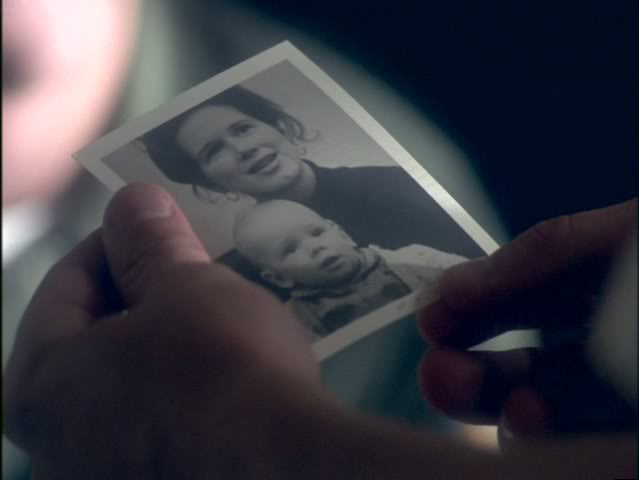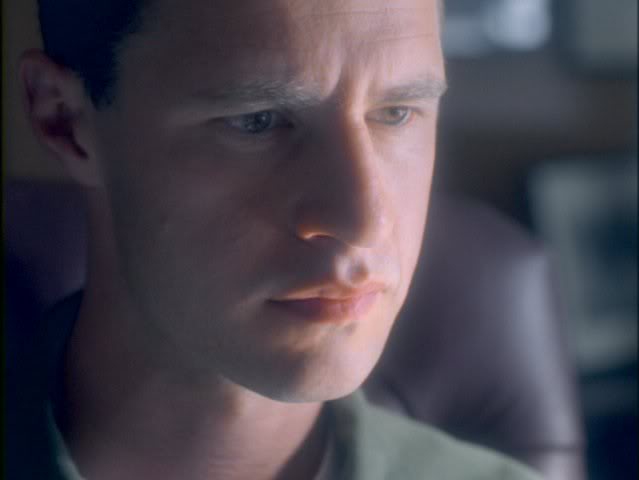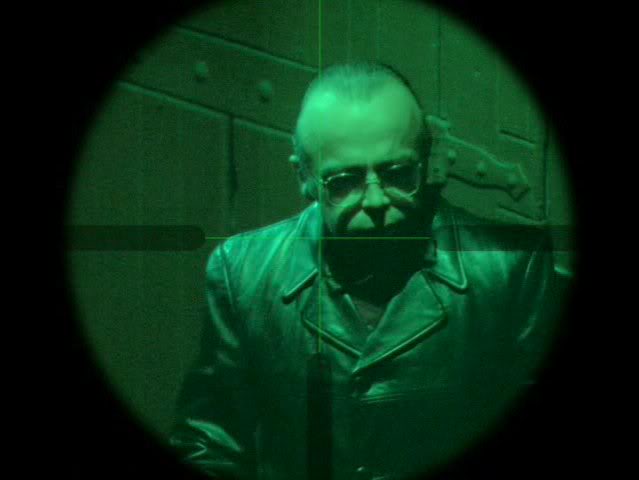CTP Episode of the Day - 07.03.06
Today's Cherished Episode: Musings of a Cigarette Smoking Man (4x07)
Original Air Date: November 17, 1996
Written By: Glen Morgan
Directed By: James WongThe secret biography of a sinister, all-powerful conspirator clears up some old mysteries -- and creates some new ones.
(Thanks to chrisnu for today's episode pics.)
"How many historic events have only the two of us witnessed together, Ronald? How often did we make or change history? And our names can never grace any pages of record, no monument will be in our image, and yet, once again, tonight the course of human history will be set by two unknown men standing in the shadows."
Some "Musings of a Cigarette Smoking Man" Tidbits & Musings:
-- The inspiration for this episode was a comic issued by DC Comics called, "The Autobiography of Lex Luthor." Glen Morgan wanted to do something like this for Cancer Man and even used chapter headings in the episode, just like in the comic book.
-- In "One Breath" there was a great scene between Cancer Man and Mulder that was nearly cut out of the final script -- because the higher-up's didn't think that William B. Davis could act. Glen Morgan and Jim Wong fought hard to keep that scene in the episode because they had confidence he could do it. You might say they brought Cancer Man full circle; they wrote his very first line in "Tooms" and eventually this CSM-centric episode.
-- There was some concern before shooting this script that the dramatic impact of the Cigarette Smoking Man, heretofore a furtive, mysterious figure with virtually no personal history, would be diluted by turning the camera on him for an entire episode. What nobody was worried about was that many viewers would take its entire premise at face value; after all, in the closing scene, Frohike tells Mulder and Scully that the whole story was something he read in a crummy magazine. But a lot of fans didn't pick up on that and thought it was indeed the factual story of CSM. "As far as I'm concerned," said Frank Spotnitz, "it isn't. Some of it may be true and some of it may not."
-- Other outside observers guessed that the whole episode was simply a clever plot to give the lead actors a week off. Wrong again. When Morgan and Wong returned to the X-Files in Season 4 (after their series Space: Above and Beyond was cancelled), they were contracted to write four episodes and already had ideas for all of them: "Home," "The Field Where I Died," "MOACSM," and a fourth that was ultimately scrapped and turned into "Never Again." They thought it would be interesting and challenging to do an episode without the series' stars, and were able to get approval to do so "when Chris was really busy and wasn't paying attention."
-- But Morgan and Wong admitted they thought Duchovny and Anderson would appreciate their effort. "It's like the fourth season and they're really burned out," explained Jim Wong, "so we thought, wouldn't it be great to do a show that they're not even in? It's not something you could do in the first three seasons" (although they came close with "3" and "One Breath") -- "but we're cool enough as a show to do an episode which the stars aren't even in. In The X-Files," he continued, "you have enough interesting supporting characters for you to be able to do this, and we thought that Cancer Man was one of the most ... I mean who the hell is he? What has he done?"
-- Indeed both Duchovny and Anderson mentioned "MOACSM" as one of their favorite episodes of Season 4, with Duchovny predictably citing his free week in Los Angeles as a major factor in his favorable mention.
-- Although Morgan and Wong collaborated on the script, Morgan received sole script credit as his partner chose the episode to make his directorial debut. "It was great," Wong said. "The crew was wonderful. I was a little disappointed that I didn't get to direct David or Gillian, but on the other hand, it was a lot of fun."
-- William B. Davis was happy to step out of the shadows and get an episode of his own, though at first, like many, he was puzzled at the seeming contradictions in the script. Claiming responsibility for the death of John F. Kennedy and Martin Luther King, Jr., was one thing, he said, but keeping the Buffalo Bills in Super Bowl Hell was another; and finding the fine line between tragedy and comedy proved to be a challenging task for the actor. During filming, Chris Carter had to speak with Davis several times, spending hours on the telephone talking about the character. Davis thought the episode made his character something that it wasn't. Carter explained that he thought Morgan and Wong were trying to express that even if your mission in life is a destroyer, you still have some hope in the back of your mind that you can be a creator and that all of a sudden this vanity is his vanity. Carter said this could be clearly seen in "MOACSM" and it makes Cancer Man sort of a "silly person."
-- Davis acknowledged Carter's assistance in helping him find his way through this episode and felt first-time director Jim Wong helped him immensely too. "A lot of the stage directions point toward farce," Davis said, "but Jim told me to play against that and just let the situation play out. The Forrest Gump scene was difficult, too. When I prepared it and did it the first time, I was almost Shakespearean in my approach. Jim made me toss it off more, and it worked out fine."
-- Although the character has been billed in the credits as the "Cigarette Smoking Man," no one actually calls him "Cigarette Smoking Man" until Scully does so in Season 6's "Two Fathers." Prior to that, he's usually referred to as "Cancer Man" (or some other colorful and endearing nicknames).
-- So very appropriate that the Lone Gunmen would use something called the CSM-25 Countermeasure Filter in an attempt to block someone we call CSM.
-- In later episodes the name of The Lone Gunmen's newsletter is "The Lone Gunman," but the sign outside their office door says: "The Lone Gunmen -- Publishers of 'The Magic Bullet' Newsletter."
-- Whipping up a sensibly budgeted JFK assassination was an interesting exercise. Producer J.P. Finn coordinated the whole affair, filmed in a downtown Vancouver location doubling for Dealey Plaza. Costume designer Jenni Gullett tracked down her counterpart from the movie JFK, borrowed the reproduction of Jackie Kennedy's famous pink suit used in the film, then had her assistant Janice Swayze scour the local stores for the rare pink boucie fabric needed to construct their own pre- and post-blood-spattered copies.
-- JFK's Lincoln Continental limousine was created by picture vehicle coordinator Nigel Habgood. He located a non-stretched Continental convertible and "customized" it. Within a span of three days, he created the illusion of a limo by (1) removing the rear seats and replacing them with smaller ones, and (2) attaching a pair of milk crates to the floor of the suddenly roomier rear compartment, therefore creating "jump seats" for "Governor and Mrs. Connally."
-- Chris Owens, playing the young Cancer Man, worked hard to accurately imitate the most important of his character's physical mannerisms. "He spent a lot of time watching how I smoke," Bill Davis said. Director Jim Wong ultimately told Owens: "When Bill takes a drag on a cigarette, it's just like sex."
-- There are several references to Morgan and Wong's former series Space: Above and Beyond in this episode: (1) Cancer Man's first novel is called Take a Chance -- a catch phrase from the series. (2) Certain cases are "classified compartmentalized" -- a level of secrecy invented by Morgan and Wong for their show. (3) In Cancer Man's novels, his main character is named Jack Colquitt, which was also the name of a soldier in the S:AAB episode "Who Monitors the Birds?"
-- The name "Jack Colquitt" was something of a good luck charm for Morgan and Wong. Jack Colquitt was the name of the very first character that Morgan and Wong wrote for a treatment script they did while working as production assistants for Producer Sandy Howard. This got them their big break -- writing the screenplay for the film The Boys Next Door (1985), a chilling account of suburban teen anomie turned deadly, starring Charlie Sheen and Maxwell Caulfield, directed by Penelope Spheeris. In addition to using the name on the above-noted episode of Space: Above and Beyond, it's also the name of an Army recruiter in an episode of 21 Jump Street that the duo wrote in 1989.
-- Deep Throat cites UN Resolution 1013 as the resolution requiring the execution of any aliens found on earth. 1013 is of course the name of Chris Carter's production company as well as his birth date (10/13).
-- When Morgan and Wong returned to The X-Files, they promised to use as many of their old Space: Above and Beyond cast members in XF or Millennium episodes as they possibly could. In "MOACSM," Morgan Weisser plays Lee Harvey Oswald; he played Lt. Nathan West on S:AAB.
-- Cancer Man's aliases when meeting with Lee Harvey Oswald and James Earl Ray are based on supposedly real people. Oswald called Cancer Man "Mr. Hunt." E. Howard Hunt wrote a number of espionage thrillers under a pseudonym at the same time that he worked for the CIA *and* was supposedly in Dallas when JFK was assassinated. His name has been batted around by JFK conspiracy theorists for many years, and he was also a key figure in the Watergate break-in. Also in the episode, James Earl Ray calls Cancer Man "Raul"; numerous people have named a co-conspirator in the slaying of Martin Luther King, Jr., as "Raul." CSM also submitted his manuscript under the name "Raul Bloodworth."
-- The episode includes a clip of Robert Kennedy stating that Aeschylus was his favorite poet. Aeschylus (525-456 B.C.) was the first of the three great Greek tragedians. He wrote perhaps 90 plays, of which seven survive intact. Often credited with inventing tragedy, he added an actor to what had been a dialogue, thus increasing its possibilities. Among his best-known plays are "The Seven Against Thebes" and "Prometheus Bound."
-- Closed Captioning revealed that Cancer Man called Deep Throat by the name "Ronald."
-- As Cancer Man thumbs through Scully's senior thesis, we can see that it contains a discussion on and references to MJ-12.
-- CSM pulls out stationery for Endeavor International Press that lists an address as 389 La Cienega Blvd., Pasadena. La Cienega Blvd. runs through a large portion of Los Angeles, but it goes nowhere near Pasadena.
-- Young Cancer Man and Young Bill Mulder were seen in the teaser for the Season 3 episode "Apocrypha," but the actors used in that episode were not used in "MOACSM." Dean Aylesworth makes his first appearance as Young Bill Mulder in this episode; he returns in the same role in "Demons" and "Travelers." Chris Owens makes his first appearance as Young CSM, a role he would repeat in "Demons." In total, Owens appeared in 13 XF episodes, playing three different roles.
-- Jerry Hardin makes his next-to-last appearance as "Deep Throat"; he wouldn't return again until Season 7's "Amor Fati."
-- The characters of "Matlock, Lydon, and Jones" (three of the men meeting with Cancer Man on Christmas Eve 1991) are presumably named for Glen Matlock, John Lydon, and Steve Jones -- respectively the (original) bassist, lead vocalist, and guitarist of the punk rock band the Sex Pistols.
-- Lots of other once and future retreads in this one: Donnelly Rhodes (General Francis) appeared as Jim Parker in Season 1's "Shapes." Tim Bissett (Agent Cook) played a medical assistant in "Folie a Deux." Peter Hanlon (The Aide) played Dr. Bailey in "Quagmire.") Paul Jarrett (James Earl Ray) played Upshaw in "Excelsis Dei." Laurie Murdoch (Lydon) played a coroner in "Schizogeny." And David Fredericks (who played FBI Director J. Edgar Hoover in this episode and in "Travelers") previously appeared in small roles in "Oubliette" and "Blood."
-- Jackie Kennedy was played by X-Files Associate Casting Director Heike Brandstatter.
-- The original captioning for Part 4 of the episode was "The X-Files: The First Man I Ever Killed." In the final version, the caption was simply "The X-Files."
-- "Walden Roth," the editor who finally buys the Cigarette Smoking Man's story for a magazine, is named for Dana Walden, Twentieth Century Fox's head of drama, and Peter Roth, president of the Entertainment Group for Fox Broadcasting Company. Roth was one of the strongest supporters of The X-Files in its early seasons.
-- The magazine in which Cancer Man's story appears is called Roman À Clef. French for "novel of a key," the term refers to a novel in which actual persons, places, or events are fictionally depicted. Two well-known romans à clef are Primary Colors, a book supposedly based on Bill Clinton's presidential campaign, and the film Citizen Kane, a fictionalized account of the life of newspaper baron William Randolph Hearst.
-- When Cancer Man goes to the magazine stand to get his copy of Roman À Clef, his eye passes over several magazines aimed at aspiring writers. One is Writer's Block Quarterly, which includes a story called "Don't Throw Away Your Typewriter: 10 Hot Tips to Help Get You Past Page 1." Another, End Credits, bears the cover lines, "Mastering Writer's Block"; "How to Handle Rejection"; and "Where the Hell is Darin Morgan?" -- a reference to Glen Morgan's brother who left the XF writing staff before the beginning of the fourth season.
-- This episode contradicts the season 2 episode "Apocrypha" where young CSM was seen in the 1950's with Bill Mulder as already a shadowy agent and smoking. This episode has CSM still a young man and not part of the Syndicate in 1963, and he does not smoke yet. Morgan and Wong acknowledged in a magazine interview that they hadn't really paid much attention to the XF during Season 3 and said "Somebody should have told us!" But the timeline in "MOACSM" didn't even match up with another Season 4 episode that Morgan and Wong wrote themselves. In "The Field Where I Died," they intimated that in one of Mulder's past lives CSM was a member of the Gestapo during World War II, but the events of "MOACSM" would mean he was a young boy during World War II.
-- A similar situation occurred in the early days of the show when Glen Morgan said that the writing staff had "enormous freedom" and thus some continuity errors made it into the shows. Morgan admits that's really why there were two different accounts of Samantha Mulder's abduction, one from Howard Gordon and Alex Gansa's first season script, "Conduit," and one from Morgan and Wong's second season "Little Green Men." Morgan said that when the mistake was caught by fans, Chris Carter explained that the differing accounts were written in to reflect the changing nature of Mulder's memories, but that Carter really made up that explanation. After the internet was abuzz with discussion of the mistake, Morgan went to Howard Gordon and said, "Why didn't you say anything?" and Howard Gordon said, "Didn't you read my script?" Morgan said it was "pretty embarrassing."
-- Did Morgan and Wong consider "MOACSM" a success? Everything but the ending. "I wanted Cancer Man to kill Frohike," Morgan said, referring to the fact that the original draft had Cancer Man shoot and kill Frohike with a high-powered rifle to show how low and evil he really was. Chris Carter disagreed and had Morgan and Wong rewrite the final scene. As director, Wong filmed both endings and thought they could convince Carter to use the ending with the Frohike death after he saw it edited in. But in a conspiracy worthy of the show itself, when they got to post-production, the film roll with the alternate ending had mysteriously disappeared before they could even try to edit it into the final product.
-- James Wong was nominated for an Emmy Award as Best Director for his work on this episode.
-- I know this episode is considered a classic by many, but it has long-remained one of my "least favorites" (yes, even up against quite a few Season 8 stinkers), and not just for the obvious reason (no Mulder and Scully). Though I respected CSM as a great lurking villain, I could just never really get interested in how or why this Cigarette-Smoking-Forrest-Gump came to shape most of the newsworthy events of the latter half of the 20th century. I suppose CSM is sort of the anti-Gump in that Forrest Gump had greatness thrust upon him, but CSM can never step out of the shadows to take credit for all he had done. But in retrospect, I wish there had been some of these "character development" episodes during Season 8 instead of the drivel we got while we were waiting for Mulder's return. During that time period, it might have been interesting to see the back-stories of Bill and Teena Mulder, Bill and Maggie Scully, CSM and Cassandra, Krycek, Marita, or more about the Lone Gunmen. Please share your first impressions, favorite (or cringe-worthy!) moments, classic lines, favorite fanfic, nagging questions, repeated viewing observations, etc., as today we celebrate "Musings of a Cigarette Smoking Man"!
Polly



